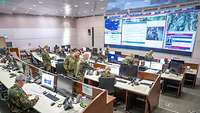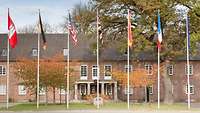
Overview of the agencies
- Date of publication
Bundeswehr Joint Force Command (BwJFC)

The Bundeswehr Joint Force Command, newly established in 2024, is in charge of the Bundeswehr’s national and joint planning, conduct and evaluation of operations. This new command will gradually take over the personnel and tasks of the Homeland Defence Command and the Joint Forces Operations Command. It is to achieve full operational readiness by 1 April 2025 and thereafter be responsible for the Bundeswehr’s operational level of command from a single source at home and abroad. The command is subordinate to the Chief of Defence and based both in Berlin and Schwielowsee. It consists of approximately 1,400 military and civilian personnel.
Bundeswehr Joint Support Command Headquarters (BwJSCHQ)
The Joint Support Command Headquarters pools the Bundeswehr’s support forces and joint capabilities. These include, for example: medical care, logistics, the military police system, the Guard Battalion, CBRN defence, civil-military cooperation, training areas, the Bundeswehr Office for Defence Planning, and the Armed Forces Office. The BwJSCHQ exercises administrative control over nearly 55,000 military and civilian personnel. This lightens the burden for the subordinate capability coordination commands and functional commands, thereby enabling them to focus on their support missions for the armed services and on further developing capabilities. By 1 April 2025, the Joint Support Command Headquarters will have reached full operational capability with around 750 posts.
Bundeswehr Command and Staff College

he Bundeswehr Command and Staff College in Hamburg is the Bundeswehr’s highest-level training and education institution. Since 1957, it has been preparing top-level military personnel for their assignments in the armed forces, NATONorth Atlantic Treaty Organization, the European Union and the United Nations. The basic and advanced training courses offered are also open to foreign officers from around 50 partner nations. Each year, the college provides over 30 different courses and seminars to train more than 2,000 officers. The college has four training departments, supported by around 120 permanent lecturers and more than 500 guest lecturers. Real Admiral Ralf Kuchler was appointed as commandant of the Bundeswehr Command and Staff College in 2023.
Federal Office of Military Counterintelligence (FOMCI)
The Military Counterintelligence Service is the German government’s third intelligence service, besides the Federal Office for the Protection of the Constitution and the Federal Intelligence Service. Its headquarters, consisting of five divisions, is located in Cologne. In addition, it has eight branch offices across Germany. The FOMCI performs the functions of a constitution protection authority in the remit of the Federal Ministry of Defence. It collects and evaluates information on anti-constitutional, espionage and sabotage activities within the Bundeswehr. It also assesses threats to Bundeswehr facilities in Germany and abroad and vets both applicants for posts in the Bundeswehr as well as current Bundeswehr personnel. With approximately 1,200 military and civilian personnel, the Federal Office of Military Counterintelligence has been headed by Martina Rosenberg since November 2020.
Leadership Development and Civic Education Centre
The Leadership Development and Civic Education Centre is the central Bundeswehr institution for further developing and conveying the concept of Leadership Development and Civic Education (Innere Führung). It helps to give the armed forces and society a more visible, concrete experience of the “citizen in uniform” concept. Established in October 1956, the centre is based in Koblenz and has a branch in Strausberg. More than 12,000 students attend the courses and seminars offered at the centre each year. The Bundeswehr Centre of Military History and Social Sciences and the Bundeswehr Museum of Military History were placed under the command of the Leadership Development and Civic Education Centre in 2017.